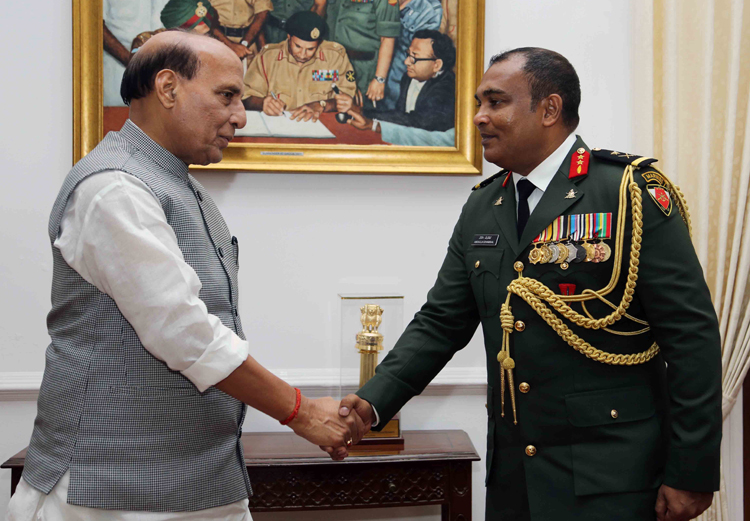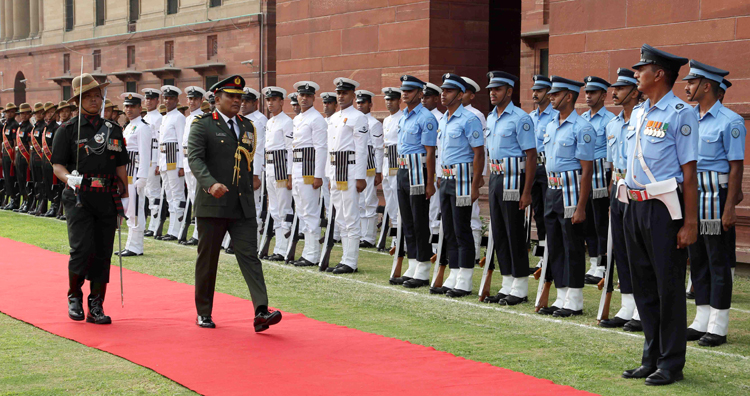INDIAN ARMED FORCES CHIEFS ON OUR RELENTLESS AND FOCUSED PUBLISHING EFFORTS

The insightful articles, inspiring narrations and analytical perspectives presented by the Editorial Team, establish an alluring connect with the reader. My compliments and best wishes to SP Guide Publications.

"Over the past 60 years, the growth of SP Guide Publications has mirrored the rising stature of Indian Navy. Its well-researched and informative magazines on Defence and Aerospace sector have served to shape an educated opinion of our military personnel, policy makers and the public alike. I wish SP's Publication team continued success, fair winds and following seas in all future endeavour!"

Since, its inception in 1964, SP Guide Publications has consistently demonstrated commitment to high-quality journalism in the aerospace and defence sectors, earning a well-deserved reputation as Asia's largest media house in this domain. I wish SP Guide Publications continued success in its pursuit of excellence.
- Prime Minister Modi Visits Punjab’s Adampur Air Base, Interacts with Airmen after Successful ‘Operation Sindoor’; Stern Message to Pakistan
- The layered Air Defence systems that worked superbly, the key element of Operation Sindoor
- Operation Sindoor | Day 2 DGMOs Briefing
- Operation Sindoor: India strikes back with Precision and Purpose
- Operation Sindoor: Resolute yet Restrained
- India’s Operation Sindoor Sends a Clear Message to Terror and the World – ‘ZERO TOLERANCE’
- Japan and India set forth a defence cooperation consultancy framework, talks on tank and jet engines
- Terrorist Attack in Pahalgam in Kashmir: Unfolding a long surgical war against PAK
- Lt General Pratik Sharma takes over Command of Indian Army's Northern Command
Maldives Defence Chief calls for India as guarantor of peace and stability in the Indian Ocean Region
Male signals return to 'India First Policy' to undo the estrangement with New Delhi during the rule of former President Yameen

Identifying religious radicalisation and violent extremism as a "critical threat", the Chief of the Maldivian National Defence Force has called upon India to act as the guarantor of peace and stability in the Indian Ocean Region.
Major General Abdulla Shamaal acknowledged India's role as a regional security provider at a lecture in New Delhi on 'National Security Vulnerabilities: Issues for Small States", organised by the Institute for Defence Studies and Analyses on July 5.
Drawing upon the precedence of India being the first responder to crises in the region, Major General Shamaal, Chief of Defence Forces of the Maldives, said India "should play a key role as a guarantor of peace and stability in the Indian Ocean Region". Regional and international stability was vital for smaller states, he pointed out.
The 'India First Policy' articulated by Major General Shamaal marks a dramatic return of Maldives to the India fold after five years of alienation during the rule of the former President Abdulla Yameen from 2013 to 2018. During Yameen's rule, the strategically located archipelago actively courted Chinese involvement in the region to dilute India's traditional influence. The defeat of Yameen by Mohammad Solih in the Presidential election of 2018 has ended the Maldivian drift
The 'India First Policy' articulated by Major General Shamaal marks a dramatic return of Maldives to the India fold after five years of alienation during the rule of the former President Abdulla Yameen from 2013 to 2018. During Yameen's rule, the strategically located archipelago actively courted Chinese involvement in the region to dilute India's traditional influence. The defeat of Yameen by Mohammad Solih in the Presidential election of 2018 has ended the Maldivian drift.
Prime Minister Narendra Modi's first foreign visit after his re-election was to Maldives last month, signifying the importance India attaches to ties with its neighbourhood. The visit was also a signal that that traditional warmth had returned to the ties after the five-year estrangement. During this visit, Modi was conferred with Maldives' highest honour for a foreign dignitary. He also addressed the Maldivian Parliament, during which he called upon all nations to unite against terror.
Echoing India's concerns, Major General Shamaal said radicalisation and violent extremism posed a "critical threat" to the states in the region. Citing the Easter attacks in Sri Lanka, he called for a multi-domain, multi-agency and multi-structural approach by various states to counter this menace. Countries in the region could draw many positive lessons from Indian culture and its democratic traditions, he said.

The General's reference to the tradition of India being the benevolent first responder to crises in the Maldives was a recapitulation of New Delhi's military intervention in 1988 codenamed Operation Cactus to undo a coup by Sri Lankan mercenaries and restore the Government of the then President Gayoom, the humanitarian assistance and disaster relief during the Tsunami of 2004 and the drinking water crisis of 2014. India has also supported Maldives in its transition to democracy and the strengthening of its institutions. It has also assisted actively in building the capacity of the Maldivian forces, and ensuring security for the archipelago.
While articulating the vulnerabilities of small states, he said lack of size and economic power has to be overcome by leveraging strategic significance, in an obvious reference to the key location of the Maldives, right in the middle of the world's busiest sea lanes.
The Military chief held that radicalisation and violent extremism posed a critical threat to the states in the region. Citing the Easter attacks in Sri Lanka, he said that it was a very complex and complicated issue which required multi-domain, multi-agency and multi-structural approach by various states to counter the menace, with a "whole of Government" and "Whole of Society" approach
Smaller states require a stable regional and international order to grow as they need to expand their influence in the international arena and also value their autonomy in decision making, he said, while calling for India to actively play the role of a stabiliser.
The Military chief held that radicalisation and violent extremism posed a critical threat to the states in the region. Citing the Easter attacks in Sri Lanka, he said that it was a very complex and complicated issue which required multi-domain, multi-agency and multi-structural approach by various states to counter the menace, with a "whole of Government" and "Whole of Society" approach.
Major General Shamaal said that the international environment today is extremely turbulent and volatile due to multi-layered complexities and uncertainties which often become unmanageable because of incomplete and ambiguous information sharing by states and security agencies. Therefore, there was a need for collective action, he emphasised, mirroring the sentiment expressed by Prime Minister Modi in Male in June.
The General also termed climate change as a serious thrreat to the Maldives. Rising water levels and temperatures are posing a critical threat to the marine ecology around Maldives as well as threatening to submerge many islands, he pointed out.





